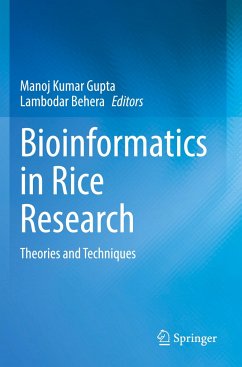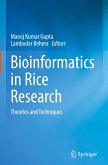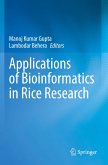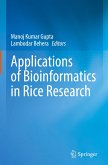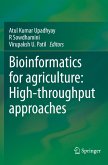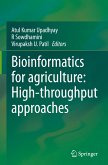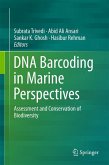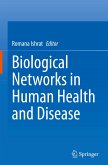Bioinformatics in Rice Research
Theories and Techniques
Herausgegeben:Gupta, Manoj Kumar; Behera, Lambodar
Bioinformatics in Rice Research
Theories and Techniques
Herausgegeben:Gupta, Manoj Kumar; Behera, Lambodar
- Broschiertes Buch
- Merkliste
- Auf die Merkliste
- Bewerten Bewerten
- Teilen
- Produkt teilen
- Produkterinnerung
- Produkterinnerung
This book provides an up-to-date review of classic and advanced bioinformatics approaches and their utility in rice research. It summarizes databases and tools for analyzing DNA, proteins and gene expression profiles, mapping genetic variations, annotation of protein and RNA molecules, phylogenetic analysis, and pathway enrichment. In addition, it presents high-throughput technologies that are widely used to provide deep insights into the genetic architecture of important traits in the rice genome. The book subsequently discusses techniques for identifying RNA-protein, DNA-protein…mehr
Andere Kunden interessierten sich auch für
![Bioinformatics in Rice Research Bioinformatics in Rice Research]() Bioinformatics in Rice Research169,99 €
Bioinformatics in Rice Research169,99 €![Applications of Bioinformatics in Rice Research Applications of Bioinformatics in Rice Research]() Applications of Bioinformatics in Rice Research137,99 €
Applications of Bioinformatics in Rice Research137,99 €![Applications of Bioinformatics in Rice Research Applications of Bioinformatics in Rice Research]() Applications of Bioinformatics in Rice Research131,99 €
Applications of Bioinformatics in Rice Research131,99 €![Bioinformatics for agriculture: High-throughput approaches Bioinformatics for agriculture: High-throughput approaches]() Bioinformatics for agriculture: High-throughput approaches129,99 €
Bioinformatics for agriculture: High-throughput approaches129,99 €![Bioinformatics for agriculture: High-throughput approaches Bioinformatics for agriculture: High-throughput approaches]() Bioinformatics for agriculture: High-throughput approaches133,99 €
Bioinformatics for agriculture: High-throughput approaches133,99 €![DNA Barcoding in Marine Perspectives DNA Barcoding in Marine Perspectives]() DNA Barcoding in Marine Perspectives116,99 €
DNA Barcoding in Marine Perspectives116,99 €![Biological Networks in Human Health and Disease Biological Networks in Human Health and Disease]() Biological Networks in Human Health and Disease161,99 €
Biological Networks in Human Health and Disease161,99 €-
-
-
This book provides an up-to-date review of classic and advanced bioinformatics approaches and their utility in rice research. It summarizes databases and tools for analyzing DNA, proteins and gene expression profiles, mapping genetic variations, annotation of protein and RNA molecules, phylogenetic analysis, and pathway enrichment.
In addition, it presents high-throughput technologies that are widely used to provide deep insights into the genetic architecture of important traits in the rice genome. The book subsequently discusses techniques for identifying RNA-protein, DNA-protein interactions, and molecular markers, including SNP and microsatellites, in the contexts of rice breeding and genetics.
Lastly, it explores various tools that are used to identify and characterize non-coding RNA in rice and their potential role in rice research.
In addition, it presents high-throughput technologies that are widely used to provide deep insights into the genetic architecture of important traits in the rice genome. The book subsequently discusses techniques for identifying RNA-protein, DNA-protein interactions, and molecular markers, including SNP and microsatellites, in the contexts of rice breeding and genetics.
Lastly, it explores various tools that are used to identify and characterize non-coding RNA in rice and their potential role in rice research.
Produktdetails
- Produktdetails
- Verlag: Springer / Springer Nature Singapore / Springer, Berlin
- Artikelnr. des Verlages: 978-981-16-3995-1
- 1st edition 2021
- Seitenzahl: 628
- Erscheinungstermin: 26. September 2022
- Englisch
- Abmessung: 235mm x 155mm x 32mm
- Gewicht: 1051g
- ISBN-13: 9789811639951
- ISBN-10: 9811639957
- Artikelnr.: 65469667
- Herstellerkennzeichnung Die Herstellerinformationen sind derzeit nicht verfügbar.
- Verlag: Springer / Springer Nature Singapore / Springer, Berlin
- Artikelnr. des Verlages: 978-981-16-3995-1
- 1st edition 2021
- Seitenzahl: 628
- Erscheinungstermin: 26. September 2022
- Englisch
- Abmessung: 235mm x 155mm x 32mm
- Gewicht: 1051g
- ISBN-13: 9789811639951
- ISBN-10: 9811639957
- Artikelnr.: 65469667
- Herstellerkennzeichnung Die Herstellerinformationen sind derzeit nicht verfügbar.
Dr. Manoj Kumar Gupta has completed his B.Sc. (Botany (Honours)) from the Calcutta University, Kolkata in the year 2007, MCA (distance course) from ICFAI University Tripura in the year 2010, M.SC. (Biotechnology) from Berhampur University, Odisha in the year 2011, and Ph.D. (Biotechnology and Bioinformatics), Yogi Vemana University, Andhra Pradesh in the year 2019. During his Ph.D., he did an internship at Max Planck Institute of Evolutionary Biology, Germany. He is working as a Research Associate in the Crop Improvement Division under Dr. Lambodar Behera, Principal Scientist, ICAR-National Rice Research Institute, India. The central theme of his research is the application and development of computational tools and techniques to understand how specific biological functions emerge from the dynamics of biological networks. He has expertise in molecular biology, bioinformatics, structural biology, and evolutionary medicine. He has successfully guided/co-guided 3 postgraduate students for M.Sc. (Biotechnology and Bioinformatics) degrees. He has also published over 30 research articles in peer-reviewed international journal and authored or co-authored many book chapters. Dr. LAMBODAR BEHERA has completed his B.Sc. (Agriculture) from the Orissa University of Agriculture and Technology, Bhubaneswar in the year 1989, M.Sc. (Biotechnology) from Tamil Nadu Agricultural University, Coimbatore in the year 1992, and Ph.D. (Genetics) from Osmania University, Hyderabad, India in the year 2000. He is presently working as Principal Scientist (Biotechnology) in ICAR-National Rice Research Institute, Cuttack, Odisha, India. He has significantly contributed in the field of rice molecular breeding, molecular biology, and genomics. He has significantly contributed to the development of 14 rice varieties suitable for different ecosystems of India. He has worked on the identification of QTLs/genes for resistance to BPH, gall midge, root-knot nematode and sheath blight disease, yield and related traits, tolerance to cold and drought; pyramiding of genes for BLB, submergence and drought resistance/tolerance, yield-related traits in the background of HYVs; assessment of the diversity of rice germplasm, insects, nematodes; molecular mechanism of low light tolerance; GWAS for identification of QTLs for drought tolerance, grain yield and related traits, and whole-genome sequencing of elite rice cultivars and donors, computational approach towards understanding the structural and functional role of different genes related to yield, and abiotic and biotic stress tolerance/resistance. He has developed a marker-assisted selection kit for gall midge resistance gene, Gm4 which is presently used in the incorporation of gall midge resistance gene, Gm4 into high yielding cultivars, Kavya, Lalat, Tapaswini, Swarna and Sambha Mahsuri. He has published 85 research articles in reputed National and International journals. He has written 11 bookchapters, 2 popular articles, 11 technical bulletins, 2 practical manuals and handled over 12 research projects financed by DBT, DST, ICAR, BIRAC, PPV and FRA of India, and BBSRC, UK. He has successfully guided/co-guided 8 research students for Ph.D., and 35 for M.Sc. (Biotechnology and Bioinformatics) degrees. He has evaluated thesis for Ph.D., M.Phil. and M.Sc. (Biotechnology and Bioinformatics) of OUAT, Bhubaneswar; Sambalpur, University, Odisha; BAU, Ranchi, Jharkhand; BCKV, Mohanpur, West Bengal; JNTU, Osmania and PJTS Agricultural University, Hyderabad, India. Besides, he has set questions and evaluated answer papers for B.Sc. (Ag), M.Sc. (Ag), M.Sc. (Biotechnology), Ph.D. students, OUAT, BBSR, Odisha, India in the Biotechnology and Bioinformatics courses. He has received Fellow of the ISGPG-2018 from The Indian Society of Genetics and Plant Breeding, New Delhi, Rashtriya Gaurav Award-2019 from India International Friendship Society (IIFS), New Delhi, and LeadingEducationalist of India in 2020 by Friendship Forum, New Delhi.
Chapter 1_Introduction to Bioinformatics.- Chapter 2_Statistics for bioinformatics.- Chapter 3_ Introduction of the databases of rice.- Chapter 4_Brief insight into the evolutionary history and domestication of wild rice relatives.- Chapter 5_3000 Genome project- A brief insight.- Chapter 6_ Databases and bioinformatics tools for data mining .- Chapter 7_Sequence Alignment.- Chapter 8_Gene identification and structure Annotation.- Chapter 9_Phylogenetic Analysis.- Chapter 10_RNA Structure Prediction. -Chapter 11_Structural Proteomics.- Chapter 12_Gene ontology and pathway enrichment analysis.- Chapter 13_High throughput sequencing technologies.- Chapter 14_Mapping algorithms in high-throughput sequencing.- Chapter 15_DNA-Protein Interaction Analysis (ChIP-Seq).- Chapter 16_RNA-Protein Interaction Analysis.- Chapter 17_SNP Identification and Discovery.- Chapter 18_Microsatellite Markers from whole genome and Transcriptomic Sequences. - Chapter 19_Genome-wide association study.- Chapter 20_Expression Profiling and Discovery of microRNA.- Chapter 21_Computational approaches in identifying long non-coding RNA.- Chapter 22_circRNA in rice.- Chapter 23_ Metagenomics.- Chapter 24_RNA-Induced Gene Silencing.- Chapter 25_Single-cell RNA sequencing technologies.- Chapter 26_Recent Advancement in NGS Technologies.
Chapter 1_Introduction to Bioinformatics.- Chapter 2_Statistics for bioinformatics.- Chapter 3_ Introduction of the databases of rice.- Chapter 4_Brief insight into the evolutionary history and domestication of wild rice relatives.- Chapter 5_3000 Genome project- A brief insight.- Chapter 6_ Databases and bioinformatics tools for data mining .- Chapter 7_Sequence Alignment.- Chapter 8_Gene identification and structure Annotation.- Chapter 9_Phylogenetic Analysis.- Chapter 10_RNA Structure Prediction. -Chapter 11_Structural Proteomics.- Chapter 12_Gene ontology and pathway enrichment analysis.- Chapter 13_High throughput sequencing technologies.- Chapter 14_Mapping algorithms in high-throughput sequencing.- Chapter 15_DNA-Protein Interaction Analysis (ChIP-Seq).- Chapter 16_RNA-Protein Interaction Analysis.- Chapter 17_SNP Identification and Discovery.- Chapter 18_Microsatellite Markers from whole genome and Transcriptomic Sequences. - Chapter 19_Genome-wide association study.- Chapter 20_Expression Profiling and Discovery of microRNA.- Chapter 21_Computational approaches in identifying long non-coding RNA.- Chapter 22_circRNA in rice.- Chapter 23_ Metagenomics.- Chapter 24_RNA-Induced Gene Silencing.- Chapter 25_Single-cell RNA sequencing technologies.- Chapter 26_Recent Advancement in NGS Technologies.

